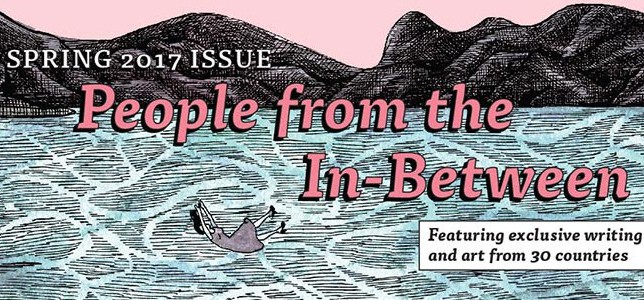Here at the Asymptote blog, we’re mining the new Spring 2017 Issue for all its treasures and have selected a few our favorite pieces to introduce here. And while we’re making introductions, I’m pleased to present two new members of the Asymptote team, Assistant Blog Editors Stefan and Sneha, who will have much more content and expertise to share in the coming months. For now, enjoy our highlights from the new issue!
“‘A Dhow Crosses the Sea’ by Ubah Cristina Ali Farah, translated from the Italian by Hope Campbell Gustafson, is a story that rises and falls from dreams to the visceral reality of the author’s roots in Somalia and Italy. Between dreams of the protagonist’s grandmother, an ecological disaster, and a capsizing dhow (a type of traditional sailing vessel), the sea is at the very heart of the narrative, its significance alternating between loss and attachment, hope and tragedy. Farah’s blending of Somali oral tradition into her writing also gives an incantatory quality to the work, wrapping you up in its sounds and smells. Those few lines from Somali, “a dhow crosses the sea, carrying incense and myrrh,” have stayed with me, sweet and comforting on the one hand, but on the other filled with an inescapable sense of danger and apprehension.”
—Assistant Blog Editor Stefan Kielbasiewicz
“Of all the uniquely special pieces in the Spring Issue brought to you by the Asymptote staff, Sananta Tanty’s poems spoke the most to me, not least because the poems were originally written in Assamese, my first language.
The fact that the poems are by an Assamese poet is significant. As you might be aware, Assam is the major language spoken in the Northeast Indian state of Assam. The region is widely regarded to have a distinct social and cultural identity compared to ‘mainstream’ India. These differences have unfortunately led to its neglect by the power centres of mainstream India, and the region has been marked by ethnic strife, political conflict, and insurgencies against the Indian state since Independence from the erstwhile British Empire. Highlighting Assamese poetry probes the fault-lines of marginality, underwriting that, even as Indian literature has been a recurring focus of the journal in an attempt to break away from the Western canon, engagement with identity politics requires constant reflection and self-reflexivity.
It is also important to note that the poet was born to a family of tea plantation workers. Assam is known around the world for tea, a legacy of British colonialism. Unfortunately the tea gardens are notorious to this day for deep class divides between the upper management and the manual labourers who were drawn from Central Indian tribal communities to work in the estates by the British tea planters in conditions many argue are akin to slavery. Tanty, a name carrying the history of his working class background, thus writes a poetry of protest against the indignities of the conditions of his community’s existence: “All twelve men were landless and without independence”. Tanty’s modernist verse is brought out in all its sparkling clarity by the translator, Dibyajoti Sarma, who is a poet and has written introspective pieces on the politics of representing literature from Northeast India in the Indian publishing industry. You can read more of Tanty’s work in the book Selected Poems Sananta Tanty, translated to English by Dibyajoti Sarma. You can also have a look at Sameer Tanti’s poems (translated by Sarma) for similar themes.”
—Assistant Blog Editor Sneha Khaund
“The excerpt from Beth Escudé i Gallès’s Diabolic Cabaret, translated by Phyllis Zatlin, made me so excited. I realize that is probably a bizarre thing to say about a rather absurd, darkly comic work of social commentary, but I couldn’t help but imagine some of my theater friends from college working on this in the basement of a dorm in preparation for an amateur production that we would have imbued with overblown significance and that uniquely naïve brand of activism that can only flourish in a walled-off university setting. It might have turned out decently and not remotely done justice to the script.
So that’s not to say there is anything naïve or amateurish about the play in the least. It’s only to say that reading the excerpt was an experience I’m sure you’ve all had: a spark of joy, perhaps even bringing you to a giggle, that is completely incongruous with the tone of what you’re reading, but that’s a result of being surprised and tickled by how incredibly good it is. Which, though I’m sure it wasn’t the reason for the title, makes calling it a cabaret more than apt. Part corrective history, part satire, and part poignant, confessional monologue, this piece of the Diabolic Cabaret was not enough for me. Here’s hoping the entire play gets staged, and published, in English very soon.”
—Blog Editor Madeline Jones
*****
Read More About Translation and International Literature on the Blog:

